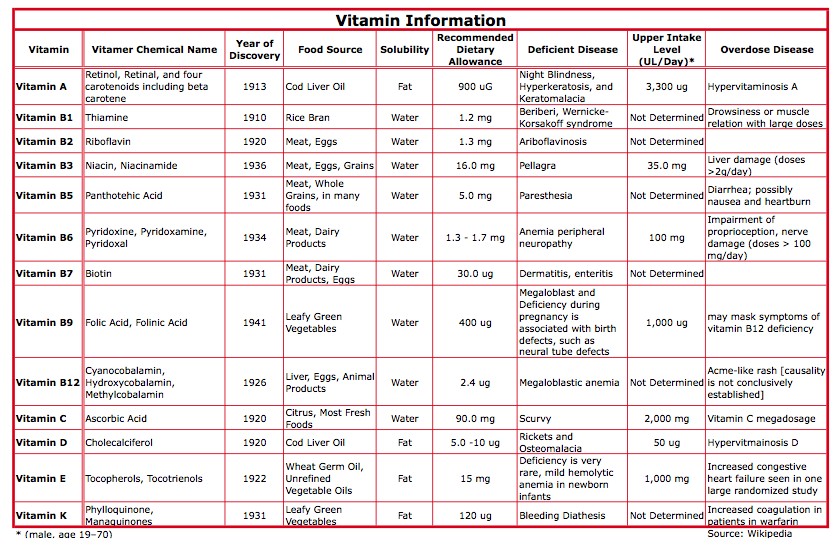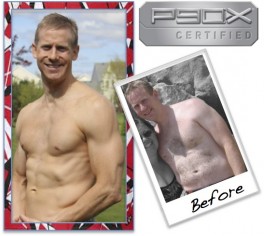Vitamins
May 13, 2011 –
Continuing on with our supplement blogs, I want to cover Vitamins today. First, a quick primer on different types of vitamins. Second, I will talk about B-Complex, C, and D in more depth. Finally, I’ll end with a discussion on vitamin supplements. There is so much to write on this topic, I couldn’t possibly cover it in one blog, but I want to provide a fundamental basic understanding to the team as it is an important topic.
What is a Vitamin?
A vitamin is an organic compound required as a nutrient in tiny amounts by an organism.
Wow Wikipedia what does that mean? Essentially, a compound is called a vitamin when it can’t be synthesized in sufficient quanitites and MUST be obtained from diet. So this is different than essential nutrients such as fatty acids, amino acids, or dietary minerals. There are 13 vitamins that are universally recognized. I have recreated a table from Wikipedia that highlights all 13 vitamins and some quick information on each. You can also click on it to download the PDF as the text is quite small. The link will direct you to my “Helpful Downloads” page where it can be found under “Coach Mike’s Miscellaneous Downloads”.

How Long does it take to get Vitamin Deficiency Disease?
The deficiency and overdose columns are not meant to scare you. However, I have no desire to get diagnosed with any of those things. The human body stores different vitamins differently. For example, vitamins A, D, and B12 are stored in significant amounts, mainly in the liver. You can be deficient in Vitamins A and D for many months and B12 for years before deficiency condition occurs. However, Vitamin B3 is not stored in significant amounts and may last only a couple of weeks. And then there have been experimental studies on vitamins like C that show first symptoms of scurvy not manifesting themselves anywhere from a month to six months.
Should I be concerned about overdosing?
Vitamin overdoses / poisoning from food is very rare. However, overdosing from vitamin supplementation does occur. The doses of vitamins different individuals are willing tolerate varies widely. The appears to be a correlation to age and state of health.
So how about some historical data? In 2008, overdose exposure to all formulations of vitamins and multivitamin-mineral formulations was reported by 68,911 individuals to the American Association of Poison Control Centers (nearly 80% of these exposures were in children under the age of 6), leading to 8 “major” life-threatening outcomes and 0 deaths.
So in a country of >300M people, less than 15,000 cases were reported for people over 6 years of age. In other words, there are other things to be more concerned about. 
Vitamins B-Complex, C, and D
You can find A, B-Complex, C, D, E, and K all in supplement form. I am going to focus on B-Complex, C, and D.
The B vitamins were once though to be a single vitamin, but it was found that they are chemically distinct although they often coexist in the same foods.
When supplements contain all eight vitamin B variants, they are referred to as a Vitamin B Complex.
So what are the health benefits of the B Vitamins?
– Support and increase the rate of metabolism
– Maintain healthy skin, eyes, hair, and promote muscle tone in the gastrointestinal tract
– Enhance immune and nervous system function
– Promote cell growth and division, including that of the red blood cells that help prevent anemia
– Reduce the risk of pancreatic cancer – one of the most lethal forms of cancer- when consumed in food, but not when ingested in vitamin tablet form.
All B vitamins are water-soluble, and are dispersed throughout the body. Most of the B vitamins must be replenished regularly, since any excess is excreted in the urine.
It is best to take B-Complex in a time-released formula (or divide up your dosage) as it passes through the body quickly.
Vitamin C
Vitamin C is a powerful antioxidant that provides numerous benefits to the body, including:
– Slows Aging
– Enhances Immunity
– Natural Antihistamine
– Pro-oxidant which increases Iron Absorbtion
– Helps you handle stress
– Maintains Healthy Gums
– Activates Folic Acid
Vitamin C is the most widely taken dietary supplement. It is water soluble, with dietary excesses not absorbed, and excesses in the blood rapidly excreted in the urine. In other words, if you take too much, you have expensive pee.
Vitamin D
Vitamin D (without a subscript) refers to either Vitamin D2 or D3 or both. Vitamin D3 is produced in the skin after exposure to ultraviolet B light. Not sure if many people say this, but when I am in the sun I like to say, “I am soaking up some Vitamin D!” It is carried through the bloodstream to the liver where it is converted into a prohormone. There are numerous benefits to Vitamin D:
– Bone Health by maintaining calcium balance
– Enhance Immune System
– Potential to Prevent Cancer
– Helps Fend Off Influenza
– Reduces High Blood Pressure and risk of Cardiovascular Disease
Here is a Beachbody Video that highlights more benefits of Vitamin D.
Vitamin Supplementation
There are so many vitamin supplements out there, how do you choose? A great place to start is a multivitamin / mineral (MVM). The good news is you can buy very cheap MVMs. But all MVMs are not created equal. It’s like anything else in life. You get what you pay for. So, what differs?
1) Cheaper MVMs focus on the 2 things that matter most to the typical consumer: taking one tablet a day and price.
2) Different MVMs use different raw materials. Here is an example. For a cheap MVM, you would use a cheap small molecule mineral so it can fit it all into one tablet instead of using a large and well-absorbed molecule.
3) Higher quality MVMs have better absorption. Many cheap MVMs aren’t even getting broken down. If the nutrients aren’t being absorbed by the body, they aren’t doing you very good.
4) Natural vs. artificial/synthetic
5) More expensive ones are typically time-released. However, you can split your dosage as well for the same effect.
6) What else is in there? Look at the entire list of ingredients. There may be other great supplements in more expensive MVMs that would replace a stand along supplement.
Additionally, different genders, life stages, and specific needs all come into play when choosing an MVM.
So what do I use?
For my first year on P90x, I got all my vitamins at Sam’s Club. Why? They were cheap.  Don’t get me wrong, there is nothing wrong with Member’s Mark vitamins, but you get what you pay for. I was taking their Complete Multi, Super B Complex with C, as well as Vitamin D.
Don’t get me wrong, there is nothing wrong with Member’s Mark vitamins, but you get what you pay for. I was taking their Complete Multi, Super B Complex with C, as well as Vitamin D.
 When I began evaluating all my supplements, I looked across all my sources of vitamins. I started looking at the P90x Peak Health Formula to investigate a higher quality MVM. What I found was that between the Health Formula and P90x Results & Recovery Formula, I was much better off. I guess that is the reason the P90x supplements were created together.
When I began evaluating all my supplements, I looked across all my sources of vitamins. I started looking at the P90x Peak Health Formula to investigate a higher quality MVM. What I found was that between the Health Formula and P90x Results & Recovery Formula, I was much better off. I guess that is the reason the P90x supplements were created together.  The P90x Peak Health Formula comes in 6 capsules per day, which I split up into 2 doses (one in the morning and one at night.) Additionally, it not only contained more of the appropriate dosages of vitamins and minerals for me, but it also contained other great supplements (like CoQ10 and Ginko Biloba). And then I add a dialy Shakeology on top of that and I know I am providing my body the BEST all day long.
The P90x Peak Health Formula comes in 6 capsules per day, which I split up into 2 doses (one in the morning and one at night.) Additionally, it not only contained more of the appropriate dosages of vitamins and minerals for me, but it also contained other great supplements (like CoQ10 and Ginko Biloba). And then I add a dialy Shakeology on top of that and I know I am providing my body the BEST all day long.
I have been using my P90X Peak Health Formula for a while now and I really do think there is a difference. It is more expensive than many cheap off the shelf brands, but if you are in the market for a high quality MVM, I would recommend it. It provides the following benefits:
– High- Potency Multivitamin / mineral
– High-Potency Antioxidant Coverage
– Immune Support
– Energy Support
– Cardiovascular Support
– Memory and Nerve Support
– Anti-Aging Support
– Anti-Stress Support
– Support for Skin, Hair, and Nails
Since I live in Chicago, the one additional Vitamin I do take is a 2000 IU Vitamin D tablet once a day. This is especially important in the very long winters we have here.
If you have any questions, please feel free to email me. And always consult your doctor if you have significant concerns or special situations.
























[…] Vitamins, many include Vitamin C and E given their antioxidant qualities and their ability to help reduce […]
[…] Oil is the second most popular supplement in the U.S. to multivitamins. However, I just saw one study that said it actually surpassed multivitamins […]